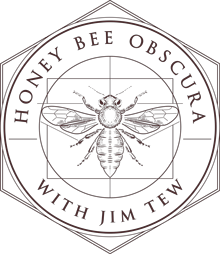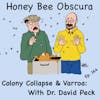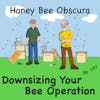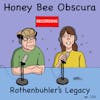Plain Talk: A Spring Walk in the Bee Yard (177)

In this episode, Jim takes listeners on an auditory stroll through his bee yard during a recent vibrant spring day. As the bees buzz energetically around him, Jim shares his personal reflections and insights on the bustling life of the hive. With the...
In this episode, Jim takes listeners on an auditory stroll through his bee yard during a recent vibrant spring day. As the bees buzz energetically around him, Jim shares his personal reflections and insights on the bustling life of the hive. With the backdrop of blooming fruit trees and a flurry of bee activity, he paints a vivid picture of a beekeeper's spring routine—from managing swarming colonies to the simple joy of observing bees at work.
Jim discusses the challenges and surprises of early spring beekeeping, such as dealing with unexpected swarms and the importance of maintaining the apiary landscape to ensure easy access and safety. He also delves into the fascinating behavior of bees during this busy season, exploring how robbers and scouts may simultaneously impact the dynamics of the hive. His narrative is sprinkled with practical tips for managing hives in spring, reflecting on the natural cycle of growth and renewal that defines this time of year.
Listeners will find solace and excitement in Jim's stories, which blend practical beekeeping advice with reflective moments that capture the essence of being a beekeeper in spring. This episode is a perfect mix of education and contemplation, suited for both seasoned beekeepers and those new to the craft.
Listen today!
______________________
This episode is brought to you by the support of Bee Culture Magazine: The magazine of American Beekeeping since 1873! Each month, Bee Culture delivers the best information in an easy to read magazine, full of content from beekeepers, researchers and regular contributors, including Jim Tew and Beekeeping Today Podcast's, Becky Masterman!
Subscribe today at: https://beeculture.com
______________________
Thanks to Betterbee for sponsoring today's episode. Betterbee’s mission is to support every beekeeper with excellent customer service, continued education and quality equipment. From their colorful and informative catalog to their support of beekeeper educational activities, including this podcast series, Betterbee truly is Beekeepers Serving Beekeepers. See for yourself at www.betterbee.com
______________________
Honey Bee Obscura is brought to you by Growing Planet Media, LLC, the home of Beekeeping Today Podcast.
Music: Heart & Soul by Gyom, All We Know by Midway Music; Christmas Avenue by Immersive Music; original guitar music by Jeffrey Ott
Cartoons by: John Martin (Beezwax Comics)
Copyright © 2024 by Growing Planet Media, LLC

Episode 177 – Plain Talk: A Spring Walk in the Bee Yard
Jim Tew: Listeners, now the spring is here, and right now, fruit bloom, blue sky. About three times a day, I get up and I make the 75-yard walk back to my bee yard. If it sounds like I've got one long, it's because I'm plodding along through grass that I should have mowed. To get to my bee yard, one of the ways you can do it is to go through my storage barn. It's full of stuff, bee stuff, tractor stuff, tiller stuff. Stay on the path, don't get off, go out the back door, and here I am.
Oh man, weeds and grass wait for no beekeeper, do they? Bees wait for no beekeeper. Dandelions everywhere. I want to tell you that I do this a lot. Actually got distracted for a minute just looking. I come out every time and I always bring a camera just because you never know what you're going to see. I always just check the entrance to see what the bees are doing. More and more I've gotten to where I check out the empty equipment, the equipment that just sits there because right there is a bee on the landing board of an empty colony.
[music]
I'd like to just ask the little bee, "What are you doing?" As I walk around here, let me tell you that I'm Jim Tew. I'm coming to you from Honey Bee Obscura, where about once a week we talk about something to do with bees. Today I'm just going to visit my bee yard and tell you what I see on this early spring day.
Introduction: Welcome to Honey Bee Obscura, brought to you by Growing Planet Media, the producers of the Beekeeping Today Podcast. Join Jim Tew, your guide through the complexities, the beauty, the fun, and the challenges of managing honey bees. Jim hosts fun and interesting guests who take a deep dive into the intricate world of honey bees. Whether you're a seasoned beekeeper or just getting started, get ready for some plain talk that will delve into all things honey bees.
Jim: Listeners, this is a nice colony. Of the five hives that are here, this one appears to be the boomer. I haven't opened these colonies really yet, and now in quite a while, so it's late winter. This is really an active colony. As I look across the neighborhood with things in bloom everywhere and you see this colony doing this kind of thing, with all this activity, then you know fairly quickly that this is going to be a swarming colony if I don't do something.
Just watching them come and go, drones, orientation, a lot of pollen collectors returning. Kim always liked to say that for every pollen-loaded bee you saw come back, that was one baby bee in the process of being grown. I'm getting bright orange pollen and bright yellow pollen. A lot of that's from fruit bloom. I don't know where the orange pollen's from. Grass on my apiary needs cutting.
Last year I bought a walk-behind string trimmer. Got to get that thing out because the grass gets so tall so fast. At first, I thought, listeners, why worry about it? It's my bee yard. I'm the only one back here. The thing is, I can't walk. If I don't keep the grass knocked down, I'm unable to walk carrying boxes and whatever, and I just have to do it. Plus I'm not the only thing back here. There's groundhogs and raccoons. Tried to talk in the past about the things that live in my bee yard besides bees. It seems to set up quite a community.
This colony I'm looking at now is sitting directly on the ground. I've got to do something, listeners. I've just got to do something to get it off the ground. This was a colony that I just stacked the equipment up. I was going to come back to it. I've had two storms in this yard. Right now I could never, ever have you visit here. It looks horrific because I've had two storms that took out trees and destroyed part of my fence. Then COVID, my own health, and other issues, and I've just not been able to get back to it, but I will get back to it.
In the meantime, what did I tell you? The bees wait for no beekeeper. They found this equipment as a swarm and they moved in. I probably shouldn't get off on this. I'd like to talk about it more formally at some time, but I don't know where these swarms come from. You'd think you'd know every beekeeper in the community. I know where some bees are, so when I pick up a bee swarm that's not mine right away, I think, "Well, I know whose bees these are," but I really don't. A lot of prominent people have researched swarming. Really, we've come a long way in our understanding of the biology. More often than not, I don't know how far those swarms flew to get here.
The other thing is, with no science whatsoever, none, I've noticed a close relationship between robbing and apparently scouting because on three separate occasions, some of my equipment was being robbed out. Then on those specific three occasions, a swarm moved in. When the swarm moved in, of course, the robbing, for the most part, apparently stopped. It seemed to me that it stopped. What I'd like to ask you, listeners, is do you think that mixed in all those robbers are actually scouts who are surveying a situation for a future nest site while other bees are looting the honey that's left? It's like two games a foot at one time.
One set of bees is just cleaning up the residue from an abandoned colony while other bees are looking at it as a proper home site for the next cycle because on those three separate occasions, that robbing was going, fairly, obviously, bees coming, bees going, erratic flight, typical robbers. Then a day or so, two later, there would be a swarm that had moved in there. Then the robbing seems to have shut down. I can't answer my own question then, if this is even an issue. Are the bees, once they take over the colony, are they able to stop it? I don't know if those robbers stop because there's a new tenant. Do the tenants defend it or is there some unspoken rule?
I want to reiterate, I have no science. I only have maybe three observations. I've long since mentioned in articles and in other places, probably one of these podcasts, that I am unable to tell the difference between a robber and a scout in most cases. The robber is supposed to have that furtive, defensive behavior. The scout is supposed to be pensive and more engineer-like in its mentality as it measures, checks, and evaluates this particular site to go back and give a sales pitch for this being the place to go.
We'll walk back to a swarm that's just moved in this season. We'll see how they're doing. Let's take a break and hear from our sponsor.
Bee Culture: Ready to take your beekeeping skills to the next level? Dive into Bee Culture, the magazine of American beekeeping, where each month you'll get expert insights, equipment tips, Varroa control strategies, and sprinkles of humor from Stephen Bishop and Ed Colby. Exclusively for Honey Bee Obscura listeners, subscribe now at beeculture.com for just $35 a year. Use the code PODCAST for a special bundle offer. Receive your hard copy delivered monthly along with full online digital access. Bee Culture, your ultimate beekeeping partner. Join our buzzing community today.
[music]
Betterbee: Give your buzzing buddies the ultimate upgrade with BetterComb. Accelerate your bee colony's growth and honey production with our innovative solution. Made from a synthetic wax that mirrors the qualities of natural beeswax, BetterComb offers a clean slate for your bees to thrive without any pesticide or disease residue. Don't compromise on quality, opt for BetterComb and watch your colonies flourish. Learn more at betterbee.com/bettercomb.
Jim: I don't want to get all sappy on you listeners, but it's a beautiful day, blue sky, and against the blue sky is these pear blossoms, and across the way on my neighbor's yard is this crabapple, pink blossoms everywhere, grass is green. It's really, really good to be able to just come back out and look at my bees again, even if you don't do anything. I guess that I'm lazy or old or both, but I do this a lot. You just stand here and you look. Do you see any bees on the grass with twisted wings? Because if you do that's pretty late in the game and whatever I was doing for my mite control program wasn't working.
No. Happily, I don't see any of that right now. On this one colony is one of the three that I was telling you about that went through and looted some honey or I guess they looted honey. I didn't open the colony at the time because it was late last winter. This colony died. On the landing board is probably a third of a cup of wax capping residue, where they stripped that colony out. For a day or two, there were just clouds of bees around this thing robbing the honey that was there. I missed it. I really would have enjoyed seeing it, but I came out later in the day and there was obviously a swarm.
Why would I say obviously, listeners? Because I don't know that anyone's ever said this, but I do it, when I'm trying to decide is these bees that have taken up residence here or these bees that are just looting the remnants that are left, I look for bees that are scenting or fanning or both. If I can see bees that have their Nasonov gland exposed on the tip of their abdomen, those bees are putting up a scent pheromone that tells other bees how to find the entrance there.
I don't think robber bees are going to be trying to recruit others. I don't know that they are. Maybe they are, but I doubt it. I look for scenting or I look for fanning as though they're trying to coup the colony. The big one, the big thing I look for is multiple pollen foragers returning. Maybe a successful pollen collector is called astray and decides to check out this seemingly bountiful supply of free honey. If I see a pollen collector, pollen collector, another pollen collector, a pollen collector, no, those bees are working steadfastly to bring back pollen because they've got a brood nest in there.
That happened. There was robbing going on, clouds of bees everywhere, and then somehow this swarm moved in. It's an okay swarm, but it's not huge. Compared to the colony I told you that's going to swarm when I first came out, maybe a third the amount of activity. Why haven't I had a look? Because I wanted to stabilize and to establish themselves, get a brood nest set up. I don't want to rip into them and have them decide that they've made a bad decision and then abscond. Normally, when a swarm moves in, I don't bother them for three to four, five days until they get their new life set up.
Cool today, too. Even though I gave you all that sappy response about what a great day it is, it's probably not much more than 45 or 50 degrees, but it's so clear. It's a still day, till everybody's flying and fairly happy here. It looks like that swarm moved in and one way or another like somebody hit a switch, the clouds of robbers went away. All right, answer me this, did the robbers go away because so much else came into bloom that the reward was more bountiful to go forage on all these apple blooms that I can see as I look around the neighborhood as compared to the pittance of resources that was left in this box?
Is that why the robbing stopped was because the resources came on and offered more of a reward? I don't know. Before I move away from this discussion completely, I came out two days later, after I told you that I don't bother the bees until they've settled down, the swarm until it settled for a few days. Well, I was so excited. I've kept these bees for years and years. I'm over 50 years now. It's still exhilarating to come out and see that you've done nothing. You meant to clean this equipment up and get it ready for whatever you're going to use it for but you just hadn't done it yet.
Not to worry because the bees have taken over that job themselves. Why don't you ask me if it was my bees? There's not but one colony here of the five that I'm talking about in this yard that's really strong enough to swarm. Just looking by the interest activity right now, it hasn't swarmed yet, but it's going to. I came out a few days later and the air was just full of bees. Every entrance this box has just had bees going crazy, and I thought, "Oh my stars, they're leaving," but if you look, there's all my cues. They're scenting. They're fanning. There's pollen collecting coming in. I just can't explain why all these bees are in the air.
Then, wanting to have some hypothesis, I decided that a second swarm was moving in. Then I wondered, can that happen? If housing locations are that tight will one swarm move in on another? I know Africanized bees used to do that, but I don't know that European bees do it that often. While I was standing here ruminating, I noticed you could just distinctly tell that they're going back in. Listeners, within sight of 12 minutes, 15 at the most, everything looked exactly normal again. It appeared to be about the same population, so I don't know what happened.
Did they all take an orientation flight at the same time? Because these bees were led here by swarm scouts that directed them right to this box, so really those individual bees have not yet learned the community and the landmarks. There's a bee scenting right there. Maybe they were just all coming out at one time making orientation flights on a good day, but they settled back down, and they're still here.
Now, I have no idea where the bees came from. I've talked about that over and over again in other articles, other podcasts. What should I do? Should I go ahead to this other colony here that also was a winter kill? Do you just let it sit here being attractive or not and see, just like fishing, if something else will come along and take that in? I don't know how to-- Tell you what I think I'm probably going to do is just leave it because that's the least amount of work.
Here's a lot of bees on the grass, but it's a cool day. If you stand long enough, it's like they warm up in the sun and then they try again. My bees are up on a hive stand and so if they miss the landing board, they drop 18 inches to the ground. Are they tired? I don't know. Beekeepers, I hope that you don't think that I'm wasting my time and yours, but I do this a lot. I just come out to be sure that the tops haven't blown off, that I'm not seeing some disease issue, that there's no chalkbrood mummies coming out, that there's no swarms hanging in the typical place, that there's no oddities that the raccoons did the night before, just to check everything.
Really, I come out primarily just because I love to do it. I just love to stand here and watch the bees be bees and me not bothering them, but I've got to warn you and the bees, just as soon as it warms up, I do have to open these bees up, get that colony off the ground and be a more traditional beekeeper. Thank you for listening if you made it this far. I'll look forward to talking to you next week. This is Jim telling you bye.
[00:19:01] [END OF AUDIO]
New to Honey Bee Obscura Podcast?
Here are some great episodes to start with. Or, check out episodes by topic.







 In this episode, Jim takes listeners on an auditory stroll through his bee yard during a recent vibrant spring day. As the bees buzz energetically around him, Jim shares his personal reflections and insights on the bustling life of the hive. With the backdrop of blooming fruit trees and a flurry of bee activity, he paints a vivid picture of a beekeeper's spring routine—from managing swarming colonies to the simple joy of observing bees at work.
In this episode, Jim takes listeners on an auditory stroll through his bee yard during a recent vibrant spring day. As the bees buzz energetically around him, Jim shares his personal reflections and insights on the bustling life of the hive. With the backdrop of blooming fruit trees and a flurry of bee activity, he paints a vivid picture of a beekeeper's spring routine—from managing swarming colonies to the simple joy of observing bees at work.








